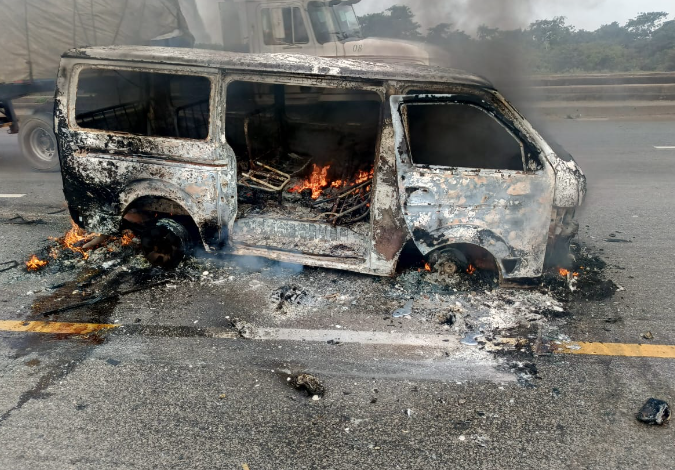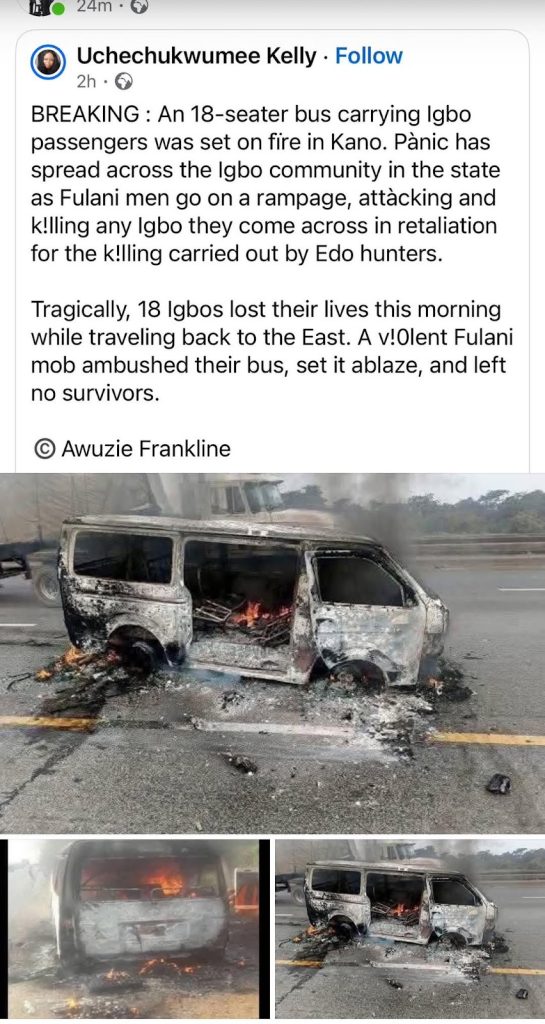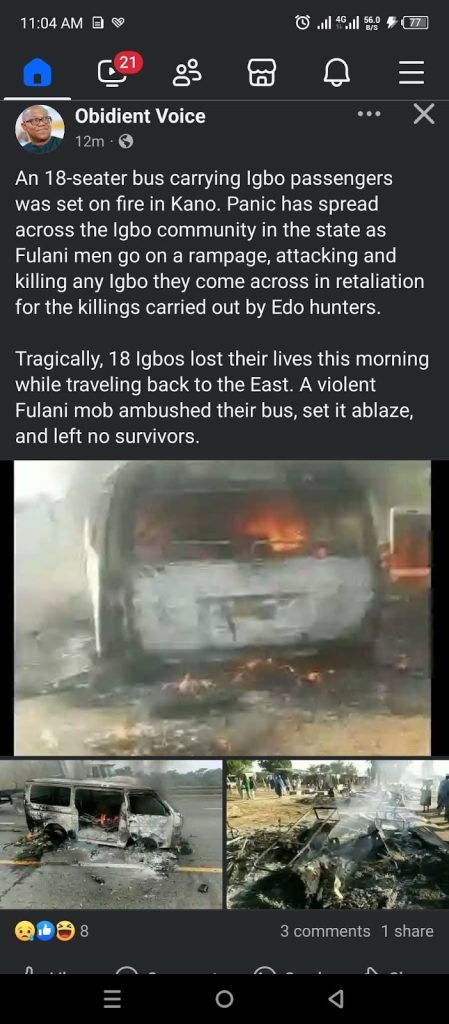Fact-Check: No, an 18-Seater Bus Carrying Passengers Was Not Burned in Nigeria’s North West
A viral social media post alleging that an 18-seater bus conveying passengers was ambushed and burned in Kano, Nigeria, is false. A fact-check reveals the images used are from an unrelated accident on the Lagos-Ibadan expressway.

A widely shared post on social media claims that an 18-seater bus carrying passengers from the South-east was ambushed and set ablaze in Kano, northwestern Nigeria, by a violent mob, leaving no survivors. According to the post, the attack was carried out in retaliation for the recent killing of Northern travellers by youths in Edo State, the country’s South-South.
The post, written in alarmist language, alleges that panic has spread across the Igbo community in Kano, with Fulani men rampaging through the city and attacking anyone of Igbo descent. It is accompanied by three images of a burnt vehicle, seemingly used as evidence of the incident. The claim has gained traction on Facebook and other social media platforms, fuelling ethnic concerns.
The claim reads:
“BREAKING: An 18-seater bus carrying Igbo passengers was set on fire in Kano. Pànic has spread across the Igbo community in the state as Fulani men go on a rampage, attàcking and k!lling any Igbo they come across in retaliation for the k!lling carried out by Edo hunters.
Tragically, 18 Igbos lost their lives this morning while traveling back to the East. A v!Olent Fulani mob ambushed their bus, set it ablaze, and left no survivors.”
It includes three images of a burned vehicle.


The facts
However, a HumAngle fact-check has found the claim to be entirely false.
A reverse image search confirms that the images used in the viral post are not from Kano. They were originally published in Sept. 2023 in reports about a vehicle fire on the Lagos-Ibadan expressway. The incident involved a bus that caught fire, but all 18 passengers escaped unhurt. The original report, published by Linda Ikeji’s Blog, a local news blog, remains accessible online.
Further investigation finds no credible evidence to support the claim of an attack in Kano. Neither law enforcement agencies nor reputable news organisations have reported any such incident. No official statements from the authorities confirm an outbreak of ethnic violence in the state.
“I can confirm authoritatively that it is not true,” Bashir Muhammed, Zonal Spokesperson of the Nigeria Police Force, Zone 1, Kano, told HumAngle. “Nothing of such happened in Kano.” Abdullahi Haruna Kiyawa, Spokesperson for the Kano State Police Command, also dismissed the claim, describing it as “fake news.”
The misleading post takes images from an unrelated road accident and falsely presents them as evidence of an ethnic-motivated attack. It appears to be a clear case of disinformation aimed at inciting fear and deepening divisions between communities.
Why it matters
The circulation of false claims like this is particularly dangerous in Nigeria, where ethnic and religious tensions have a long and volatile history. The country has witnessed violent clashes triggered by misinformation, making verifying claims before spreading them crucial.
This particular claim surfaced in the wake of recent extrajudicial killings of Northern travellers in Edo State. By falsely depicting a retaliatory attack, the post stokes division and could escalate hostilities between communities. In a digital era where misinformation spreads rapidly, such posts can provoke real-world consequences.
How to verify such claims
As discussions about the Edo killings continue, more false claims are likely to emerge, either to instigate violence or to push a specific narrative.
Before sharing unverified information, it is essential to cross-check sources. Conducting a reverse image search using tools like Google Images or TinEye can reveal whether a picture has been used out of context. Reliable news reports should always be sought to confirm the authenticity of such claims. Additionally, statements from law enforcement agencies and government officials should be considered before drawing conclusions.
Social media users must be wary of posts that use inflammatory language or attempt to exploit ethnic or religious sentiments. False claims often rely on emotional triggers to gain traction, making critical thinking essential in countering misinformation.
Conclusion
The claim that an 18-seater bus carrying Igbo passengers was ambushed and burned in Kano is false. The images used in the post were taken from an unrelated accident on the Lagos-Ibadan expressway, where no casualties were recorded. No credible evidence supports the claim, and it appears to be a deliberate attempt to spread misinformation and incite ethnic tensions.
A social media post falsely claims that an 18-seater bus carrying Igbo passengers was ambushed and set ablaze in Kano, Nigeria, as ethnic violence retaliation, but a HumAngle fact-check dismissed this as disinformation.
The images were originally from a non-fatal vehicle fire on the Lagos-Ibadan expressway, and no credible evidence or reports support the alleged attack. Disinformation like this can exacerbate ethnic tensions in Nigeria, highlighting the importance of verifying claims through credible sources, reverse image searches, and official statements.
Support Our Journalism
There are millions of ordinary people affected by conflict in Africa whose stories are missing in the mainstream media. HumAngle is determined to tell those challenging and under-reported stories, hoping that the people impacted by these conflicts will find the safety and security they deserve.
To ensure that we continue to provide public service coverage, we have a small favour to ask you. We want you to be part of our journalistic endeavour by contributing a token to us.
Your donation will further promote a robust, free, and independent media.
Donate HereStay Closer To The Stories That Matter




